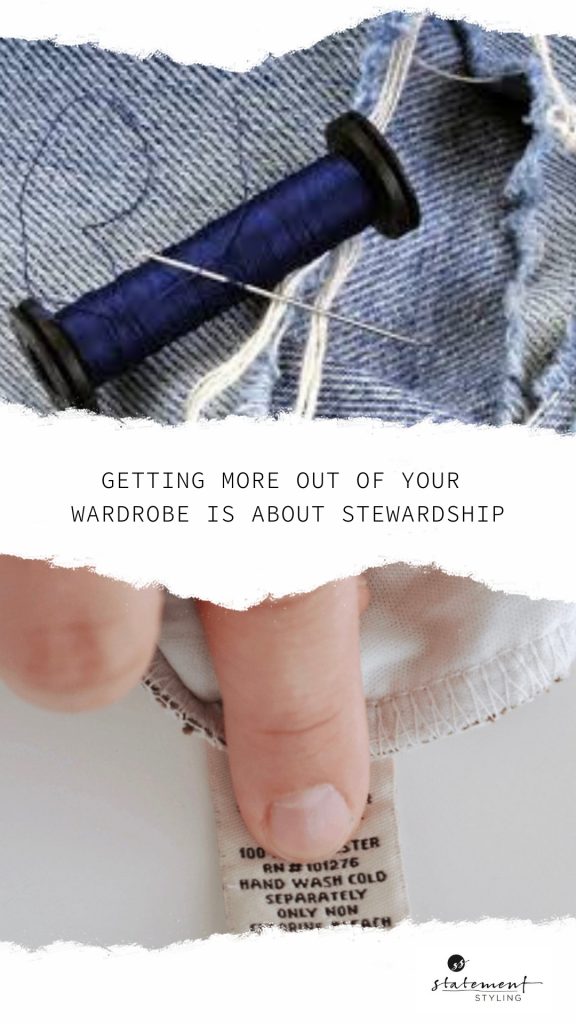“YOUR CLIENTS MUST BE REALLY RICH!”
“I CAN’T AFFORD TO BE STYLISH.”
“WHAT I LOOK LIKE ISN’T THAT IMPORTANT TO ME THAT’S WHY I JUST BUY CHEAP CLOTHES.”
I can’t tell you how many of these comments I have heard over the years; objections as to why a person thinks they will never be stylish, to justify the status quo in their life or to argue that style is an elitist ideal but not for the everyday person. But underneath all of these objections is the idea that wealth is a prerequisite for personal style.
This is why it is surprising to people that my clients are everyday people; they are not famous, they have mortgages and bills and kids and responsibilities just like you and I, they have just chosen to embrace themselves and manage their resources with purpose and excellence. And what could be better for everyone than individuals taking responsibility for their own impact on others and the world around them?
What is Style Stewardship?
I can remember being 21, a poor university student with a social event to attend. I went shopping on Chapel Street looking for something to wear out that night. I was lured into a high-end boutique by the chíc minimalist window display and picked up a skin coloured tight shimmery dress which looked particularly good on the mannequin. “What am I even doing in here?” I thought, “Everything is too expensive for me!” but somehow I felt better shopping in such fashionable surroundings and walking out the door with that oversized boutique bag. Needless to say, that dress was only worn once and then relegated to the dark end of my wardrobe along with so many others.
You might think that my shopping fail came down to my being young and foolish, but isn’t this the way that so many of us shop? Emotionally, without a strategy and ultimately without success. Since I go through people’s wardrobe’s for a living, I know that haphazard purchasing is common place, and it’s not just limited to expensive bad purchases. Somehow, the cheaper the clothes are, the more random the selection, because I suppose the stakes are lower. Thankfully, there is a better way. It does sound decidedly unsexy but ‘style stewardship’ is a term I coined to describe the meeting point of beauty and purpose in everything clothes, style, fashion and wardrobe.
Style is a particular form, design or mode of expression.
Stewardship is an ethic that embodies the responsible planning and management of a resource.
Together, the concept relates to finding a way to express who you are, enhance your look, leverage your skills and purpose, in a way where you are making the most of all the resources at your disposal and not wasting time, money or emotional energy. The result feels like confidence, being in empowered in your decision making, feeling comfortable in your own skin and having a plan for how you can stay on top of all of the above, indefinitely.
That sounds good, right?
So how do we help you to become a Style Steward?
We start by understanding who you are, what your life is like, where you have come from, where you are headed, what is important to you, what your nature and personality are like and what your physical attributes and colours are. We then come up with a strategy about how to create a wardrobe for you that is stocked with good quality, well-made clothes that create an authentic impression of who you are and teach you how to shop update your wardrobe over time. It also involves learning how to properly look after the things you purchase; how to wash, repair and reuse things. The result is:
- You always have something to wear;
- No more last-minute shopping;
- You are always ready for events and holidays;

- You save money;
- You buy better clothes; and
- You can shop at your convenience.
But wait, there are more kickbacks!
When people take style stewardship seriously, the kickbacks go beyond just helping you achieve your goals, empowering you and making you feel and look good. One of the notable benefits is that you automatically become more sustainable because you are buying less clothes, wearing everything longer, taking better care of each item and therefore have more money to purchase better clothing.
I may be a tad idealistic, but I believe that if we all collectively pursued style stewardship, we could exert pressure on the fashion industry to improve the quality of workmanship, garment makers could be paid a living wage and consumers would seriously reduce consumption which would kill the fast fashion industry. And our wallets, earth and self-esteem would thank us.

